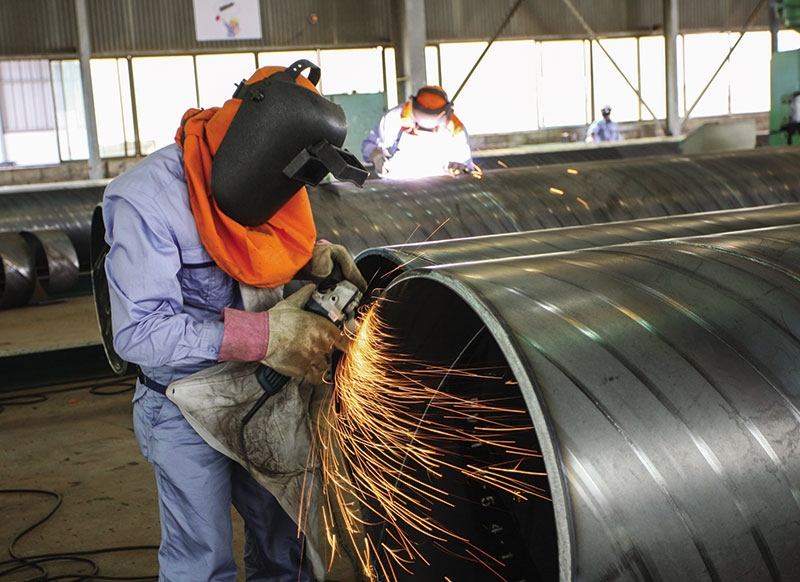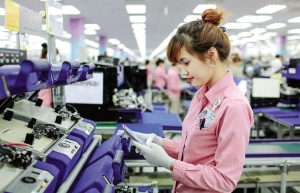Trade war makes Vietnam a haven
 |
| More and more businesses are looking at Vietnam as an alternative production hub, Photo: Le Toan |
Last week, the Quang Ninh People’s Committee was visited by 72 Japanese businesses seeking investment and business opportunities in the northern province in many sectors such as electronics, heavy industry, finance, property, and garments and textiles.
Nguyen Duc Tiep, a representative of the Quang Ninh Investment Promotion Centre, told VIR that Quang Ninh, with its Van Don Economic Zone expected to be developed into a special administrative economic zone, is becoming a hot investment destination for Japanese firms.
“Many of these Japanese firms have been operating in China. However, they want to expand their investment markets out of China to shun risks caused by the nation’s rising production costs and by the US-China trade war, which is making it hard for Japanese firms to export their products to the US from China,” said Tiep, who is in charge of supporting Japanese investors in Quang Ninh.
A recent survey of over 4,630 Japanese firms investing into 20 nations and territories, including 652 in Vietnam, conducted by the Japan External Trade Organization (JETRO), showed that 70 per cent of
respondents said they will expand their business in Vietnam and continue considering Vietnam an important investment destination. The rate is only 48 per cent for China. 65.1 per cent of respondents said they are making profits in Vietnam.
As of July 20, Japan had 3,835 valid investment projects in Vietnam, registered at $55.86 billion, making Japan the second-biggest foreign investor in Vietnam. In the first seven months of this year, Japan’s registered investment capital in Vietnam was nearly $6.9 billion.
Meanwhile, Hong Sun, vice chairman of the Korea Chamber of Business in Vietnam representing over 6,000 South Korean businesses in the country, told VIR that the US-China trade war is “prompting many South Korean businesses to come to Vietnam from China”.
Currently, most South Korean firms in China produce and export goods to the US. “However, the very high US tariffs on Chinese goods worry South Korean businesses. Thus, they seek alternative places for their trade,” Sun said. “Vietnam is an ideal place, since production costs are lower and it has a number of free trade agreements with other nations in the world. Those South Korean firms are turning Vietnam into their new production base.”
As of July 20, South Korea had 7,080 valid investment projects in Vietnam, registered at $61.5 billion, making South Korea the biggest foreign investor in Vietnam. In the first seven months of this year, South Korea’s registered investment capital in Vietnam was nearly $5.46 billion.
According to professional services firm Dezan Shira and Associates, with the US-China trade friction’s impacts, Vietnam could serve as an alternative to China for investors. Already, the country is benefitting from companies’ “China plus one” strategies, which involve investors in China shifting focus or expanding to other countries to increase market access, diversify risks, and reduce labour costs.
“The growing trade war will hasten the shift, especially for labour-intensive consumer goods industries such as clothing, footwear, and electronics,” the firm said in a recently released bulletin on the US-China trade war’s impacts on Vietnam. “Vietnam, an export-oriented economy with foreign direct investment (FDI) accounting for the majority of exports, will attract more foreign investors as manufacturers continue to restructure their supply chains to reduce the impact from the US tariffs on China.”
In a recent report, JLL, a major US professional services and investment management firm, expressed its assumption that China’s gradual shift from basic, labour-intensive industries to a new focus on bolstering its value chain has created a wave of firms moving their production bases from China to Southeast Asian countries; and with its strategic location, Vietnam stands to benefit from these moves. In addition, concerns over the increasing trade tension between the US and China have prompted companies based in China to move to Vietnam to evade the high tariff impositions.
Trang Le, research director at JLL in Vietnam, said, “Vietnam currently proves the best choice to the wave of businesses intending to move their factories out of China, chiefly due to the ever-increasing business expenses (land rents, labour costs, and more). In addition, the US-China trade war prompted firms to quickly find safer and more attractive locations.”
Chairman of the Vietnam Association of Foreign-Invested Enterprises Nguyen Mai, however, warned Vietnam not to be content with the current developments, saying that the country needs to further improve the investment climate and push up administrative procedure reforms to maintain its advantages.
“Last year, China lured over $100 billion from foreign firms, while the figure for Vietnam was a mere $17.5 billion. China, a market with a population of 1.4 billion, is very appealing to foreign investors, so Vietnam must scale up its efforts to entice the growing FDI flows,” Mai said.
 | Growth in the shadow of a trade war The trade tensions between China and the US may not be as harmful as they may sound, at least for countries that are not targeted ... |
What the stars mean:
★ Poor ★ ★ Promising ★★★ Good ★★★★ Very good ★★★★★ Exceptional
Related Contents
Latest News
More News
- Japanese business outlook in Vietnam turns more optimistic (January 28, 2026 | 09:54)
- Foreign leaders extend congratulations to Party General Secretary To Lam (January 25, 2026 | 10:01)
- 14th National Party Congress wraps up with success (January 25, 2026 | 09:49)
- Congratulations from VFF Central Committee's int’l partners to 14th National Party Congress (January 25, 2026 | 09:46)
- 14th Party Central Committee unanimously elects To Lam as General Secretary (January 23, 2026 | 16:22)
- Worldwide congratulations underscore confidence in Vietnam’s 14th Party Congress (January 23, 2026 | 09:02)
- Political parties, organisations, int’l friends send congratulations to 14th National Party Congress (January 22, 2026 | 09:33)
- Press release on second working day of 14th National Party Congress (January 22, 2026 | 09:19)
- 14th National Party Congress: Japanese media highlight Vietnam’s growth targets (January 21, 2026 | 09:46)
- 14th National Party Congress: Driving force for Vietnam to continue renewal, innovation, breakthroughs (January 21, 2026 | 09:42)

 Tag:
Tag:




















 Mobile Version
Mobile Version